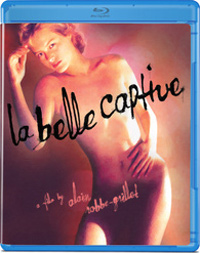 While 2014 saw the passing of (reluctant) New Wave icon Alain Resnais, there was an intense resurgence of interest in the directorial efforts of Last Year at Marienbad (1961) scribe Alain Robbe-Grillet. Grillet and Resnais would never collaborate again, but it left the screenwriter with his own directorial options, which he used to explore his abstract fetishes in a filmography that would span ten films, many of which never made it to the United States. Kino Lorber’s Redemption label resurrected five rare titles for Blu-ray over the past year, including his 1963 debut L’immortelle and New Wave classic Trans-Europ-Express (1967). But it would be Grillet’s eighth feature that would serve to be his most internationally renowned, the 1983 La Belle Captive, which chanteys its way into Blu-ray this month courtesy of Olive Films. No more cohesive than any of the other puzzling titles in his filmography, the stunning work from DoP Henri Alekan (Cocteau’s La Belle et la Bete and Wenders’ Wings of Desire) enlivens Grillet’s captivating erotic noir tropes.
While 2014 saw the passing of (reluctant) New Wave icon Alain Resnais, there was an intense resurgence of interest in the directorial efforts of Last Year at Marienbad (1961) scribe Alain Robbe-Grillet. Grillet and Resnais would never collaborate again, but it left the screenwriter with his own directorial options, which he used to explore his abstract fetishes in a filmography that would span ten films, many of which never made it to the United States. Kino Lorber’s Redemption label resurrected five rare titles for Blu-ray over the past year, including his 1963 debut L’immortelle and New Wave classic Trans-Europ-Express (1967). But it would be Grillet’s eighth feature that would serve to be his most internationally renowned, the 1983 La Belle Captive, which chanteys its way into Blu-ray this month courtesy of Olive Films. No more cohesive than any of the other puzzling titles in his filmography, the stunning work from DoP Henri Alekan (Cocteau’s La Belle et la Bete and Wenders’ Wings of Desire) enlivens Grillet’s captivating erotic noir tropes.
Walter Raim (Daniel Mesguich) works as a secret agent for something called the Organization, or so his voiceover narration tells us as he gazes over the dance floor of a smoke filled club and spies a comely blonde woman (Gabrielle Lazure), who admits she has forgotten her own name as they dance the night away. When Walter leave the club, he finds the same woman collapsed in the middle of the street, her hands tied. He stops for help at a villa where nicely dressed men swarm around her as if she were a prized item, and they’re locked in a room where Walter unties her and they make love. In the morning, the villa looks as if it was hit by a torrential storm and there’s no sign of anyone else. He’s got bite marks on his neck and he sets out to find out more about the woman, but is constantly thwarted by his superior in the organization, motorcycle riding Sara Zeitgeist (Cyrielle Clair).
Opening with an empty portrait frame in front of crashing waves on the beach, we return to the repeated frame and beach motif throughout the film, with a large, painted copy of the same scene, as well as postcard copies factoring throughout. They could very well be black holes into other realities within the film, but at a basic level, Grillet seems to embrace that fact that reality can easily be ‘framed.’ Much like Agnes Varda’s Agnes on the Beach, Grillet seems fascinated with this beach side motif, along with his customary shoe fetish factoring heavily in the proceedings. Apparently this is all inspired by the imagery of Rene Margritte, whose name is observed on said painting, as well as the serials of Louis Feuillade (Les Vampires). While we can’t make heads or tails (or should that be guns or shoes?) of just how insidious the Organization is that Walter works for, or how sinister the improbably named Sara Zeitgeist and her speeding motorcycle really is (predating similar imagery we’d see in Leos Carax’s Mauvais Sang), it unfolds like a richly photographed elliptical dream.
Disc Review:
If the irritatingly abstract narrative structure of La Belle Captive tends to grate, one can easily be distracted by the sumptuous visuals of Henri Alekan’s, who captures an essence of a period in film that’s equal to work done by the likes of Jean-Francois Robin or Philippe Rousselot in titles from Jean-Jacques Beineix, sans the dated soundtrack. But, at least here, Grillet is more menacing than those titles from the Cinema du Look movement, and his fetishistic flourishes look exquisite in this transfer. Devoid of any extra features beyond the original trailer, Grillet’s most notable flourish still resides outside the popular zeitgeist, which may explain the lack of embellishment.
Final Thoughts:
Sweet dream, beautiful nightmare, or butchered fantasy? Grillet prized incomprehensible, non-linear narratives, sometimes to such an extent that films seem to have been made up as he went along. La Belle Captive manages what many of his previous titles are unable to do, captivate us with a particular, foreboding beauty. The object of affection is portrayed by Gabrielle Lazure, while Arielle Dombasle is credited as ‘the hysterical woman,’ though this isn’t the type of hysterical femininity as we’d see in one of Zulawski’s females. Lazure’s a passive feminine archetype of the male fantasy, gliding along a beach in a flowing peignoir, for instance. Even when the film dips into horror tropes, hinting that the she could be some kind of vampire or succubus, she’s never really threatening. Ending strangely, with a voiceover that seems to confirm the subtle hints that Mesguich’s Walter is a pawn in some grand mindfuck of an experiment, we’re still confounded by what Grillet’s really saying, except that, perhaps, we should be as wary of pretty faces as we are of any other.
Film: ★★★/☆☆☆☆☆
Disc: ★★★/☆☆☆☆☆


